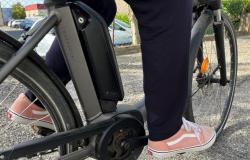
Every year around 4,000 people, including a “vast majority” of illegal migrants, visit the premises of the health center of the NGO Médecins du Monde, located less than two kilometers from the Stade de France, the Olympic basins and the Adidas Porte de la Chapelle, major sites of the Paris Olympics.
A stone’s throw from the main Olympic Games sites in Seine-Saint-Denis, a health center run by the NGO Médecins du Monde will close its doors during the summer so as not to “expose” its undocumented patients to the expected increase in checks police officers.
Miscarriage, tuberculosis, acute dermatitis: the waiting room is always full on this June day at the NGO’s Access to Care and Orientation Center. However, it will no longer welcome anyone between July 1 and September 15.
“It’s a very heavy decision but we cannot expose undocumented immigrants to the risk of arrest,” explains Matthieu Dréan, manager of the site.
“Increased police presence” in the street
Every year around 4,000 people, including a “vast majority” of illegal migrants, frequent these premises located less than two kilometers from the Stade de France, the Olympic basins and the Adidas Porte de la Chapelle, major sites of the Olympic Games. from Paris.
For several weeks already, volunteers have observed “an increased police presence” in the street. To protect the sporting event which will take place from July 26 to September 8 (including the Paralympic Games), nearly 45,000 police officers and gendarmes are mobilized. They will be supported by 18,000 soldiers.
Transport controls will also be strengthened and will dissuade patients, anticipates the NGO present since 2004 in the poorest department and the first medical desert in mainland France.
If two other sites will be temporarily opened in the same department, in Pantin and Bobigny, accessible by bus, metro or tramway, the association fears that these patients, half of whom have been in France for less than three months, will not choose to go underground.
“Already in ordinary times we have very suspicious people who tear down the walls and who need to be reassured. We are afraid today that they will give up on seeking treatment and will not come back,” worries Agnès, a volunteer at the ‘welcome.
A few meters away, a prostrate woman has just learned that she is having a miscarriage while the waiting room silently fills with drawn-featured patients.
“As discreet as possible”
“In the vast majority” they have not seen any doctor in France before, notes the structure.
“For people with chronic illnesses, there is a real morbidity issue, and for those who need psychological support, it is a form of abandonment,” laments doctor Isabelle Pipien.
Migrants “all have a difficult experience, often marked by violence, even if they do not always express it in the first place and somatize them”, explains the doctor, recalling that the road to exile puts a strain on physical health. and psychological aspects of migrants.
Marina, a 43-year-old undocumented Ivorian, suffers from acute dermatitis. This cleaning lady, who was able to open her rights to State Medical Aid (AME) at the center, has an appointment with a dermatologist in a year.
“It won’t be long, it hurts me,” she says in a thin voice. “I think it’s stress,” euphemizes the young homeless person.
Eager to watch the Olympic Games on television and discover the new 100-meter champion, Marina, a fan of sprint legend Usain Bolt, fears controls during this period. However, it includes the significant presence of police officers to ensure the safety of spectators.
“The return to school in September worries us”
Aged 24, Ayoub, 59 kg and 1.84 meters tall, came to seek treatment for multiple sclerosis, a neurodegenerative disease diagnosed in Morocco. The young man who works on construction sites will have to go to another site to collect the missing medications, the doctor informs him.
“I hope they will leave us alone, but I’m not at home here in France, I can’t say anything,” he slips. “I’m going to be as discreet as possible.”
After the Olympic Games, the consequences of the closure of the center on the health of these patients will be measured, judges the NGO.
“The return to school in September worries us” to the highest degree, warns Matthieu Dréan, also “extremely concerned” by the political situation and the possible rise in power of the far right in the legislative elections.





